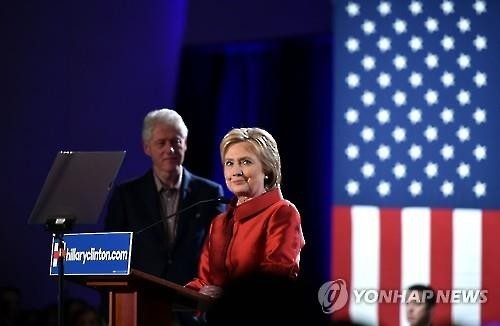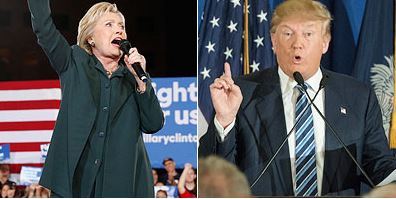Hillary Clinton captured Nevada's Democratic caucuses Saturday, overcoming an unexpectedly strong surge by Bernie Sanders and potentially easing the anxiety of some of her supporters.
Republicans were competing for votes in South Carolina, where Donald Trump, Ted Cruz and Marco Rubio were in a tight, three-way contest as polls closed. Jeb Bush and other candidates were lagging behind, according to early exit polls.
In Nevada, Clinton won the backing of voters who said electability and experience were important in their vote. But in a continuing sign of her vulnerability, Sanders did best with voters looking for a candidate who is caring and honest.
 |
(Yonhap) |
The polling of voters was conducted for The Associated Press and the television networks by Edison Research as voters arrived at 25 randomly selected caucus sites.
She capitalized on a more diverse Democratic electorate who helped her rebound after a second-place finish to Sanders in the New Hampshire primary.
"Some may have doubted us, but we never doubted each other," Clinton told her cheering supporters during a victory rally in Las Vegas. "This one is for you."
She said Americans are "right to be angry," but are also hungry for "real solutions."
Sanders, a Vermont senator and self-described democratic socialist, congratulated Clinton on her victory, but then declared his campaign has "the wind at our backs as we head toward Super Tuesday" -- the multi-state voting contests on March 1.
Clinton's victory in Nevada could be vital in holding off a challenge from Sanders that has been tougher than almost anyone expected. Clinton narrowly won the leadoff caucuses in the Midwestern state of Iowa, but the Vermont senator had a runaway victory in the tiny northeastern state of New Hampshire.
 |
(Yonhap) |
Clinton now leads in delegates pledged to her at the Democratic Party's national convention in July, but only has a fraction of the number needed to secure the nomination. Clinton's win means she will pick up at least 18 of Nevada's 35 delegates.
For both parties, the 2016 election has laid bare voters' frustration with Washington and the influence of big money in the political system. The public mood has upended the usual political order, giving Sanders and Trump openings while leaving more traditional candidates scrambling to find their footing.
No candidate has shaken the establishment more than Trump. The billionaire businessman spent the week threatening one rival with a lawsuit, accusing former President George W. Bush of lying, and even tangling with Pope Francis on immigration.
The prospect of a Trump win alarmed rival Jeb Bush, the former Florida governor trying mightily for a strong showing in the first Southern state to vote.
"Trump can't win, plain and simple," Bush told reporters outside a polling place in Greenville, South Carolina. "This isn't about appealing to people's deep anxiety... He can't be president. A ton of people would be very uncomfortable with his divisive language and with his inexperience in so many ways."
A Trump victory could foreshadow a solid performance in the collection of Southern states that vote on March 1. Victories in those Super Tuesday contests could put the billionaire in a commanding position in the delegate count, which determines the nomination at the party's national convention in July.
Trump has run a campaign punctuated by outrageous statements, including a call to ban the entry of Muslims to the United States. At his last election rally Friday night he upped the ante in his remarks about them, repeating the widely discredited story of American Gen. John Pershing, who was said to have halted Muslim attacks in the Philippines in the early 1900s by shooting the rebels with bullets dipped in pigs' blood.
Cruz, who has challenged Trump's conservative credentials, banked on a well-regarded get-out-the-vote operation and 10,000 volunteers to help overtake Trump on Saturday, as well as in the Southern states that follow.
A failure to top Trump in South Carolina could puncture that strategy, though the Texas senator, who sidetracked briefly to Washington to attend the funeral Mass for Supreme Court Justice Antonin Scalia, will still have more than enough money to run a long campaign.
Rubio, the Florida senator, and Bush were fighting to establish themselves as credible alternatives to Trump and Cruz, candidates some Republican leaders believe are unelectable in November.
Neither Bush nor Rubio expected to win South Carolina. But they wanted to finish ahead of one another; otherwise, there would be tough questions about long-term viability.
Rubio scored the endorsements of several prominent South Carolina politicians, including Gov. Nikki Haley, and seemed to have rebounded after a dismal debate performance two weeks ago that contributed to a disappointing fifth-place finish in the New Hampshire primary.
Bush hoped his deep family ties to South Carolina -- his brother and father each won two primaries here -- would be a lifeline for his struggling campaign.
Also in the mix was Ohio Gov. John Kasich, who had low expectations in South Carolina. He was looking toward more moderate states that vote later in March. Retired neurosurgeon Ben Carson had a small but loyal cadre of followers. (AP)









